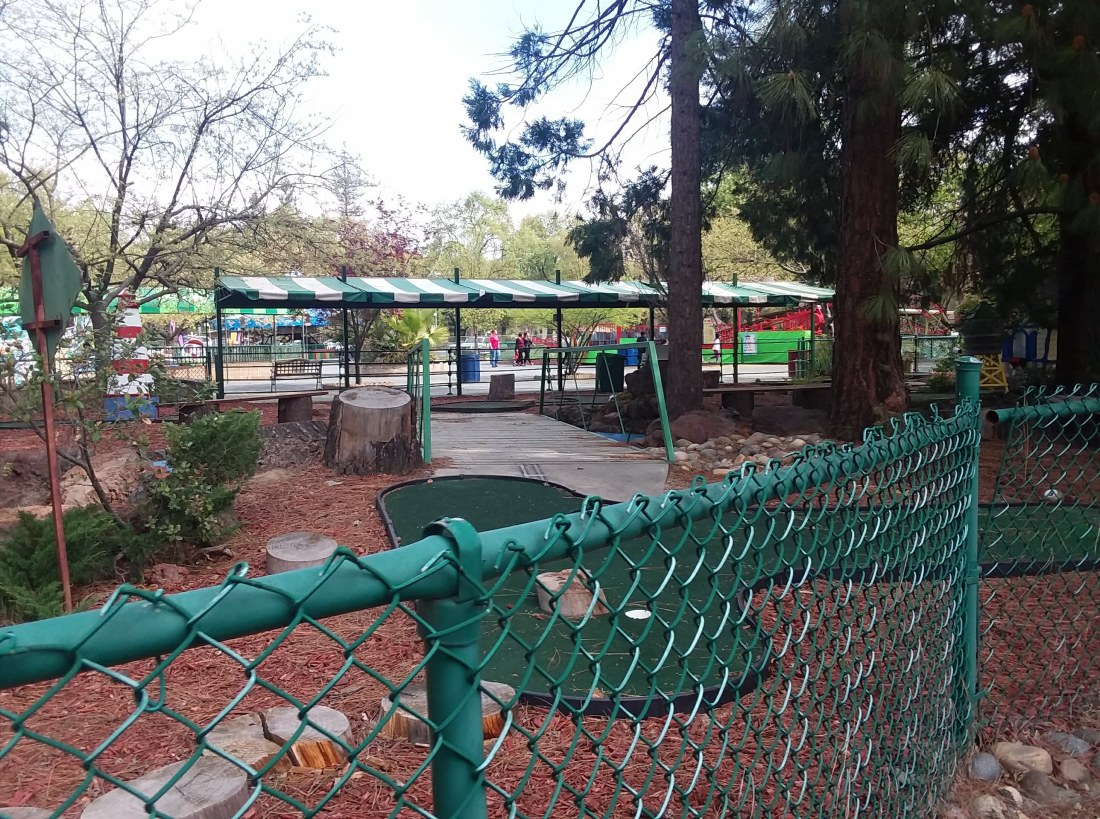It’s been pretty warm lately, so yesterday we decided to take the boys to the park. We loaded up some snacks and some soccer balls and made our way to Micke Grove Park, where we played and played all morning and had a great time. It really is a nice park.
The park also has a zoo. And next to the zoo is Funtown. Funtown is a mini amusement park. A park within the park.
I remember going to Funtown when I was a kid. I remember it being fun. And being excited to go there. My kids were excited, too. And they had fun. But, as an adult, Funtown was…interesting.
Funtown resembles sort of a post-apocalyptic amusement park. Like, if, say, seventy percent of the population died in a plague, and afterwards there were still amusement parks, the amusement parks would be like this.
Or, if you’re familiar with George Saunders stories, Funtown is like an amusement park in a George Saunders story.
Micke Grove Park, and everything in it, including Funtown, is operated by the county’s Parks and Rec Department, and, when compared to, say, an amusement park that is not funded by a county but rather by a megacorporation, like, say, Disneyland, Funtown is a vivid demonstration of the haves and have-nots.
We were the first to arrive. Funtown had two employees. Later we would learn that there were three employees, but one was running late. One of the employees was a nice lady who sold us tickets. The other employee was a youngster, as was the employee who would arrive late. The youngsters were nice, too.
As we were buying tickets, Liz and I saw on a sign that Funtown had mini-golf. We’d been talking about taking the boys to play mini-golf, but the nice lady informed us that the mini-golf course was currently closed. They were having a problem with some geese.
“Geese?”
“Yeah, a bunch of geese took it over. So it’s not safe. But we think we can get it open again this weekend.”
Here’s a picture of the mini-golf course. You can’t see any geese, but you can imagine them, hiding out, ready to strike.
There are about nine rides at Funtown. They’re fairly typical rides: tilt-a-whirl, roller coaster, carousel, etc. But the challenge, for a Funtown employee, given that there are nine rides (plus a ticket booth, and a concession stand) but only three employees (and one is late) is that if some family is hanging around a ride looking like they want to ride it, then one employee has to drop whatever they were doing and go operate that ride.
Our first ride was the fish. It’s fish that go around an octopus, which the kids thought was great.

But about the time we finished with the fish, two more families arrived, which made it much more complicated for the two employees. Luckily the second youngster showed up, late, but then a fourth family showed up, too, and someone needed to sell them tickets.
So we and one of the other families decided to sort of stick together, ride-wise, to make it easier.
Next was cars. Cars that go around and around. First Tom tried to pick this purple car, but, as indicated by the caution tape and the sign, it was unavailable.

The sign says: “This car is down (sad face). Don’t ride me.” A pedantic English teacher might point out that the point of view of this sign is inconsistent.
The tilt-a-whirl, nearby, was in a similar situation: at least one tilty-car had an Out of Order sign taped to it (but no caution tape).

Then we went for the train ride. It’s a little train that runs all around the perimeter of the park. We sat in the first car, right behind the engine. The instrument panel reminded me of the 1958 Cessna Luscombe my grandfather used to take me flying in when I was little.

Once the passengers were all loaded, before departing, the youngster reached under the driver’s seat and pulled out a hammer. Then he crawled under the engine and banged on something a few times. Then he got up and looked at me and said, “I have to do that to start it.”
After a few tries, it started right up, and we were off.
Here’re three pictures. One picture is of the youngster banging with the hammer, another is of Liz watching the youngster bang on the engine that will next transport her entire family around the park, and the third picture is of the youngster driving the train.
And here are pictures of Tom and Sam, delighted with the train ride:
The train ride included a view of the bathroom, which you get to by going out the back gate, past the dumpster, and this fenced off area where they collect all of the broken Funtown stuff:
The train also passed the roller coaster, the theme of which is Giraffe, or perhaps Safari, and these two guys, who were working on The Scrambler, seemingly trying to figure out what was wrong with it (we didn’t ride The Scrambler):
We would encounter these two guys again later, at this airplane thing that Sam rode:

During the ride, Liz overheard the guys talking. It turns out one guy was a (the?) manager, and the other guy was an inspector. The manager guy told the inspector guy that they could only afford to re-paint one or two rides a year. The planes were due for some paint.
As soon as Sam got off, the guys swooped in. They had been watching closely, and something apparently didn’t look right:

Here’s the thing: when you go to Disneyland, the employees are all very nice and helpful. They seem, genuinely, to want you to have a good time.
But the employees at Funtown, all three of them, were also very nice and helpful. And they also seemed, genuinely, to have wanted our boys to have a good time (which they did; they talked about it all afternoon).
The difference is, the nice and helpful Disneyland employees have a lot more to work with. They know they have a good product, backed by a corporate machine (as opposed to a parks and rec department). The nice and helpful Disneyland employees don’t have to crawl under the train and bang it with a hammer. They don’t have to hand-crank the roller coaster to get it going. And they generally don’t have to battle geese for territory.























